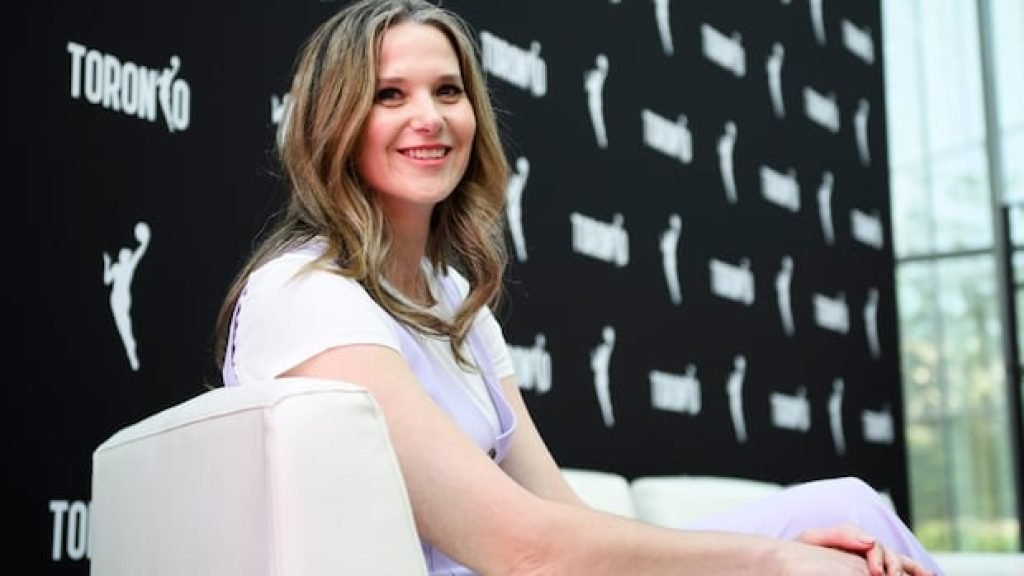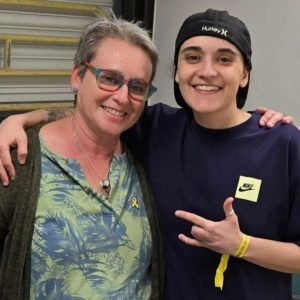
The WNBA’s Toronto Tempo are alive — sort of.
Set to join the league as an expansion team in 2026, the franchise revealed its nickname, logos and colours earlier in December.
Yet the team remains, largely, an idea — one that won’t be realized until there are players.
“Oh, won’t that be fun? We get to talk about the game we love — soon and very soon, right? Now that we have a name, that’s next up,” president Teresa Resch said in an interview with CBC Sports.
Resch added that she hopes to have a general manager in place early in the new year who will lead the basketball side of operations.
Meanwhile, as Golden State sets to enter the league in 2025 — one year ahead of Toronto and expansion sister Portland — it selected its first group of players in the expansion draft last Friday one day after the Tempo reveal.
The Valkyries will continue adding through free agency, which begins Feb. 1, and in April’s entry draft, where they hold the fifth pick.
How Golden State’s roster looks on May 16, the date of its home opener, should be instructive for the Tempo as they embark on a similar process over the next 18 months.
Glen Grunwald, an assistant GM for the expansion Toronto Raptors in 1995, said the goal should be to develop a basketball identity for the Tempo, then choose players who fit within that structure.
He said the Raptors began planning for the expansion draft over a year in advance.
“We had a simulated draft when the normal entry draft happened the year before. We set up our own little draft room with our scouts and our staff there, participating as if we had a draft choice just to make sure that we were getting up to speed in terms of how we were going to operate from a player personnel perspective,” Grunwald said.
“And then, over the course of the next year, we ran several expansion draft simulations to see what we thought other teams might be thinking.”
Resch, who was previously an executive with the Raptors, likely watched the Valkyries’ expansion draft very closely.
What Golden State emerged with is a roster that does not yield a ton of optimism for on-court success in Year 1.
Given that reality, players may be hesitant to uproot their lives for a team that appears destined for near-term failure.
WATCH | Resch discusses how Toronto chose Tempo nickname:
Teresa Resch says the team went through more than 10,000 submissions before coming to a decision.
Selling Toronto to players
Grunwald said his pitch to incoming players would include selling them on first-class facilities, a top-notch coaching staff and a slice of history.
“They’ll always be the first players for the Toronto Tempo. … And to be part of the groundwork of a great franchise is something you try and sell to the players. And allow them to have their input from their experience in terms of what it takes to be a winning team and a winning franchise,” Grunwald said.
Resch’s case will also feature the city of Toronto prominently.
Among the Valkyries 11 expansion-draft selections were seven international players.
“This team represents not only Toronto, but Canada,” Resch said. “And really for the WNBA, a gateway to the world. So we really look forward to having a lot of people from many places, not just Canada, represent the Toronto Tempo on a world stage.”
Valkyries coach Natalie Nakase said the international-heavy draft wasn’t intentional. But with two of those players not having played in the WNBA last season, GM Ohemaa Nyanin indicated there may have been some strategy.
“Our first order of business will be to make them trust our organization and prove that we want to establish a mutually beneficial relationship with them,” Nyanin said the day after the draft.
As the first and only international WNBA team, Resch also noted that “it’s really important that Canada is well represented.”
“It may look like people on our business side, people on our basketball side or people on the court,” she said.

More options
For Grunwald’s Raptors, the Canadian player pool was limited, but Resch should have more options on and off the court.
The WNBA did not publicize teams’ protection lists, but of the four Canadian WNBAers, Kia Nurse is a free agent, while it’s not difficult to imagine Atlanta’s Laeticia Amihere being left unprotected, given her limited rookie-year role.
Coaching candidates could include longtime national teamer Natalie Achonwa, who recently retired to become an assistant at the University of Michigan.
Still, Grunwald cautioned that winning should trump all: “that’s the best marketing plan.”
Golden State’s philosophy appears to be patient-building, though it could always prove people wrong as the NHL’s Vegas Golden Knights did when they reached the conference final in their first year, then captured the Stanley Cup three years later.
But Toronto may not be afforded as much time, as it tussles with Portland and the early stages of the Valkyries.
Then again, Toronto could have a major advantage over Golden State initially. Much of the league will filled with unrestricted free agents next winter.
Per Spotrac, the only WNBA players under contract past 2025 are on rookie deals. With a new TV rights agreement set to kick in for 2026 — and an expected salary-cap bump along with it — league veterans appear to be biding time for a pay day. Which means Toronto could see plenty of opportunity to imitate the Golden Knights and become an immediate winner.
Still, in the competitive landscape of the WNBA, Grunwald preached patience. His Raptors scuffled to a 21-61 record, yet they’re best remembered for handing Michael Jordan’s 72-win Chicago Bulls one of their nine losses.
“It’s an exciting time and you’re creating something new. I just remember it being a lot of work, but a lot of fun as you build it out. And get the fans to be part of it and be part of the process and enjoy it as the team is built,” he said.
“Even though the first year might not be the most successful year, it could be. And when it does get successful, then you’ve been there from day one.”







